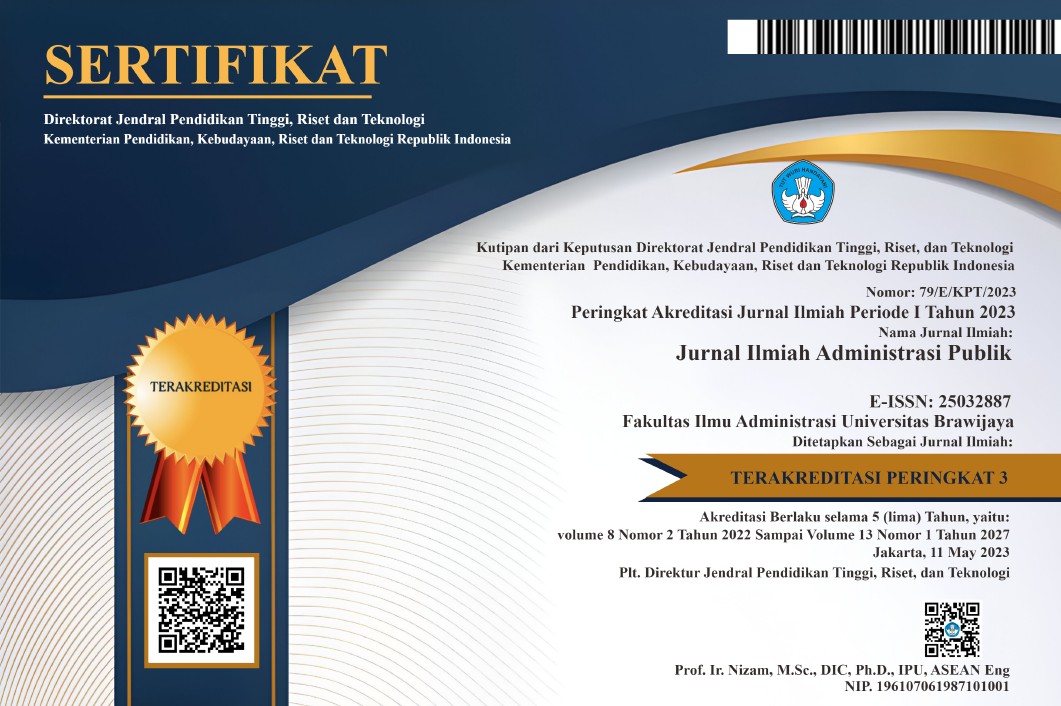Fiscal Decentralisation and Economic Growth in Indonesia
DOI:
https://doi.org/10.21776/ub.jiap.2019.005.03.8Keywords:
fiscal decentralisation, economic growthAbstract
Fiscal decentralisation is deemed as an effective policy to increase efficiency in providing public goods and appears as a way to foster economic growth. This paper addresses the theoretical and empirical linkage between fiscal decentralisation on economic growth. Here, we use five decentralisation measures to capture the multidimensional aspect of fiscal decentralisation. Using data from the lowest level of government and the latest data in Indonesia from 2010 to 2017, the results showed that fiscal decentralisation is significantly and negatively related to economic growth.References
Akai, N., and Sakata, M. (2002). Fiscal Decentralization Contributes to Economic Growth: Evidence from State-Level Cross-Section Data for the United States. Journal of Urban Economics, Vol. 52(1), pp.93–108.
Baltagi, B. H. (2005) Econometric Analysis of Panel Data (3rd edn). West Sussex: John Wiley & Sons Ltd.
Canaleta, C. G., Arzoz, P. P., and Garate, M. R. (2004) Regional Economic Disparities and Decentralisation. Urban Studies, Vol. 41(1), pp.71–94.
Cantarero, D., and Gonzalez, P. P. (2009). Fiscal Decentralization and Economic Growth: Evidence from Spanish Regions. Public Budgeting & Finance, Vol. 29(4), pp.24–44.
Davoodi, H., and Zou, H. F. (1998). Fiscal Decentralization and Economic Growth: A Cross-Country Study. Journal of Urban Economics, 43(2), pp.244–257.
Devkota, L. K. (2014). Impact of Fiscal Decentralization on Economic Growth in the Districts of Nepal. International Center for Public Policy Working Paper Series, at AYSPS, GSU paper1420, pp.14-20, International Center for Public Policy, Andrew Young School of Policy Studies, Georgia State University.
Gemmell, N., Kneller, R., and Sanz, I. (2013). Fiscal Decentralization and Economic Growth: Spending Versus Revenue Decentralization. Economic Inquiry, Vol. 51(4), pp.1915–1931.
Headey, D. D., and Hodge, A. (2009). The Effect of Population Growth on Economic Growth: A Meta-Regression Analysis of the Macroeconomic Literature. Population and Development Review, Vol. 35(2), pp.221–248.
Hendri. (2015). Fiscal Decentralization and Regional Economic Growth in Sumatera, Indonesia. Thesis, Institute of Social Studies, The Netherlands.
Kis-Katos, K., and Sjahrir, B. S. (2017). The Impact of Fiscal and Political Decentralization on Local Public Investment in Indonesia. Journal of Comparative Economics, Vol. 45(2), pp.344–365.
Ligthart, J. E., and Van Oudheusden, P. (2017). The Fiscal Decentralisation and Economic Growth Nexus Revisited. Fiscal Studies, Vol. 38(1), pp.141–171.
Lin, J. Y., and Liu, Z. (2000). Fiscal Decentralization and Economic Growth in China. Economic Development and Cultural Change, Vol. 49(1), pp.1–21.
Lozano-Espitia, I., and Julio, J. (2016). Fiscal Decentralization and Economic Growth in Colombia: Evidence from Regional-Level Panel Data. Working Paper, Revista CEPAL, Naciones Unidas Comisión Económica para América Latina y el Caribe (CEPAL), August.
Mankiw, N. G., Romer, D., and Weil, D. N. (1992). A Contribution to the Empirics of Economic Growth. The Quarterly Journal of Economics, Vol. 107(2), pp.407–437.
Martinez-Vazquez, J., and McNab, R. M. (2003). Fiscal Decentralization and Economic Growth. World Development, Vol. 31(9), pp. 1597–1616.
Martinez-Vazquez, J., and Timofeev, A. (2010) Decentralization Measures Revisited. Working Paper, Andrew Young School of Policy Study, Georgia State University, Georgia, USA.
Musgrave, R.A. (1959) The Theory of Public Finance. McGraw Hill, New York.
Nguyen, L. P., and Anwar, S. (2011). Fiscal Decentralisation and Economic Growth in Vietnam. Journal of the Asia Pacific Economy, Vol. 16(1), pp.3–14.
Oates, W. E. (1999). An Essay on Fiscal Federalism. Journal of Economic Literature, Vol. 37(3), pp.1120–1149.
Blöchligeri, Hansjörg., Bartolinii, David., and Sibylle Stossberg. (2016). Does Fiscal Decentralisation Foster Regional Convergence?. OECD Economic Policy Paper, No.17, pp.1–19, OECD, France.
Rondinelli, D. A., Nellis, J. A., and Cheema, G. S. (1983). Decentralization in Developing Country: A Review of Recent Experience. World Bank Staff Working Paper, Number 581, The World Bank, Washington DC.
Roodman, D. (2009). How to do xtabond2: An Introduction to Difference and System GMM in Stata. Stata Journal, Vol. 9(1), pp.86–136.
Seymour, R., and Turner, S. (2002). Otonomi Daerah: Indonesia’s Decentralisation Experiment. New Zealand Journal of Asian Studies, Vol. 4, No. 2, pp.33-51.
Siburian, M. E. (2017). Regional Growth and Fiscal Decentralization a Case of Indonesia. International Journal of Sciences: Basic and Applied Research, Vol. 36(3), pp.271–290.
Swasono, F. (2007) Fiscal Decentralization and Economic Growth: Evidence from Indonesia. Economics and Finance in Indonesia, Vol.55(2), pp.109–134.
Thiessen, U. (2003). Fiscal Decentralisation and Economic Growth in High-Income OECD Countries. Fiscal Studies, Vol. 24(3), pp.237–274.
Xie, D., Zou, H., and Davoodi, H. (1999). Fiscal Decentralization and Economic Growth in the United States. Journal of Urban Economics, Vol. 45(2), pp.228–239.
Yushkov, A. (2015). Fiscal Decentralization and Regional Economic Growth: Theory, Empirics, and the Russian Experience. Russian Journal of Economics, Vol. 1(4), pp.404–418.
Zhang, T., and Zou, H. (1998). Fiscal Decentralization, Public Spending, and Economic Growth in China. Journal of Public Economics, Vol. 67(2), pp.221–240.
Downloads
Published
Issue
Section
License
If your paper is accepted, the author identified as the formal corresponding author for the paper will receive an email prompting them to login into Author Services; where via the JIAP Author Licensing Service they will be able to complete the license agreement on behalf of all authors on the paper.














